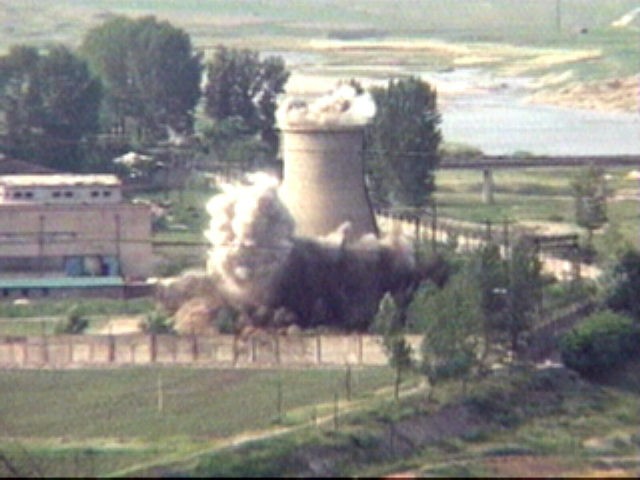Judging by satellite images of the Yongbyon Nuclear Research Center, North Korea’s primary reactor for creating weapons-grade nuclear material might be up and running. There is clearly activity at the plant, although skeptical analysts say it is difficult to ascertain precisely what the reactor is doing without a ground-level inspection.
NPR on Monday quoted conflicting opinions from Jeffrey Lewis of the Middlebury Institute of International Studies and image analyst Frank Pabian of the North Korea-focused website 38 North.
Lewis thought it looked like “business as usual at Yongbyon at the moment,” based on satellite photography that captured personnel arriving for work and materials being delivered.
“It looks pretty much like it’s looked for the last 10 or 15 years,” he said.
“If I had to bet, I’d say it’s most likely not operating,” countered Pabian, pointing to lack of steam from the turbines and the pattern of ice melting outside the reactor, which he said looked more like natural seasonal melting than the result of heat from an operational nuclear reactor.
Lewis and Pabian agreed it is difficult to know exactly what the North Koreans are doing at Yongbyon without independent inspections.
In any event, while they have refrained from missile tests as relations thawed with the United States and South Korea, the North Koreans have not specifically promised to shut down all of its nuclear facilities or decommission its existing weapons. North Korean dictator Kim Jong-un has hinted at shutting down at least part of the Yongbyon complex in exchange for sanctions relief, so for the moment it would be in his interest to keep the reactor operational, or at least make it look operational.
NPR also quoted former nuclear weapons scientist Siegfried Hecker, who visited Yongbyon several times in the previous decade and found the facility “old” but “functional.” Hecker recalled seeing Yongbyon’s nuclear scientists growing their own vegetables in a nearby field and employing “primitive safety equipment,” but he was favorably impressed by the overall competence of the staff.
Fortune on Saturday predicted Yongbyon will be a major topic of discussion between President Donald Trump and Kim Jong-un at their second summit in Vietnam this week, noting that South Korean officials have expressed confidence Kim is ready to negotiate the reactor away.
“A deal to shutter Yongbyon would represent Trump’s first tangible victory toward reducing Kim’s nuclear capacity since he granted an unprecedented meeting last June — even though North Korea has made similar promises before,” Fortune observed.
“The move could potentially deprive Kim of enough plutonium to make roughly one atomic bomb a year, and possibly other materials needed to make smaller, more powerful nuclear weapons,” the magazine continued. “Still, that would fall far short of the ‘final, fully verified denuclearization’ that Secretary of State Michael Pompeo and other Trump administration officials have demanded.”
Analysts quoted by Fortune believe North Korea has a smaller, secretive facility it could employ to produce smaller amounts of weapons-grade material if Yongbyon is closed. Even if they produced no more bomb materials, the North Koreans have a good deal of plutonium and uranium stockpiled, so their efforts have been focused on developing the missile technology needed to deliver nuclear warheads across intercontinental distances.
Becker nevertheless submitted that shutting down Yongbyon would be a “big deal” because it would diminish enriched uranium production and effectively halt plutonium production. The price Kim will demand in return for such a concession will likely be steep.
Reuters on Monday quoted analysts who said, “Time is running out on Washington’s ‘maximum pressure’ campaign,” making it likely Kim will obtain some of the sanctions relief he seeks. Sanctions violations are a growing problem, North Korean allies are pressuring the international community to grant relief, and concern is mounting over the humanitarian effects on civilians from isolating the North Korean economy. Inconveniently, Vietnam – site of the upcoming Trump-Kim summit – has been tagged as one of the sanctions violators.

COMMENTS
Please let us know if you're having issues with commenting.